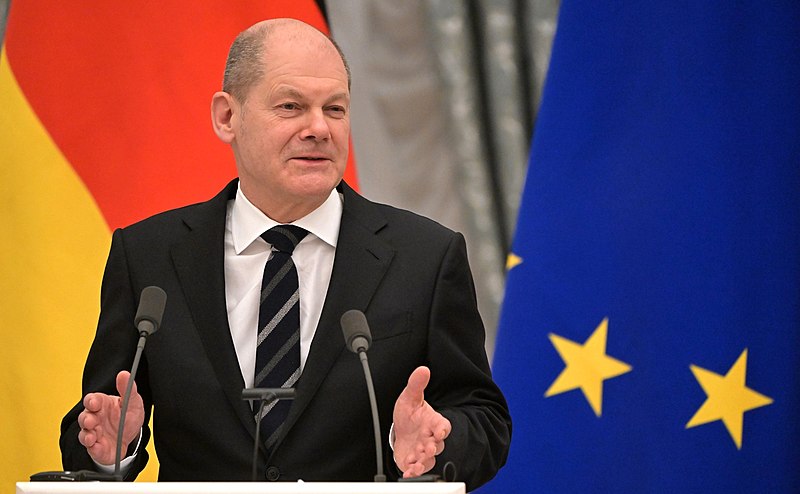On 28 October, German president and member of the Social Democratic Party (SPD) Frank-Walter Steinmeier addressed an array of distinguished guests at Bellevue Palace, his official residence. In his ‘State of the Nation’ address, he noted that the world was “heading into a period of confrontation” and that the “struggle for dominance” was coming to the fore.
He warned his audience that “harder years, rough years are coming” and that the “peace dividend has been eaten up”. In order for Germany to hold its own in this world situation, he explained, “we [need the] will to assert ourselves,” to show the “strength for self-sacrifice,” and “first and foremost, a strong and well-equipped Bundeswehr [the German armed forces].” When Russia launched its invasion of Ukraine in February, German chancellor Olaf Scholz (SPD) announced that it demanded a “Zeitenwende”, or “turning point” in Germany’s approach to foreign politics, including significant increases in military spending.
Where is this demand for a so-called Zeitenwende coming from?
[Note: the term “Zeitenwende”, first used by Scholz in his February speech, has since become a regular theme in the capitalist press in Germany. It is used to denote a new period, as well as a new government policy. Whereas they claim that German politics had been defined in the past by a ‘pacifism’ suitable for a time of peace, cooperation and prosperity; they now talk about a Zeitenwende in which the world has become more ‘multipolar’ and ‘fractured’, thus justifying the German ruling class’ new militaristic course.]
Imperialist showdown
Capitalism’s insatiable thirst for profit forces the capitalists to seek out and control new markets. But when the whole world is divided among the international monopolies and their imperialist states – especially the USA, China, and the EU with Germany at its head – they are forced to rob each other and intensify the plunder of the smaller, dependent states.
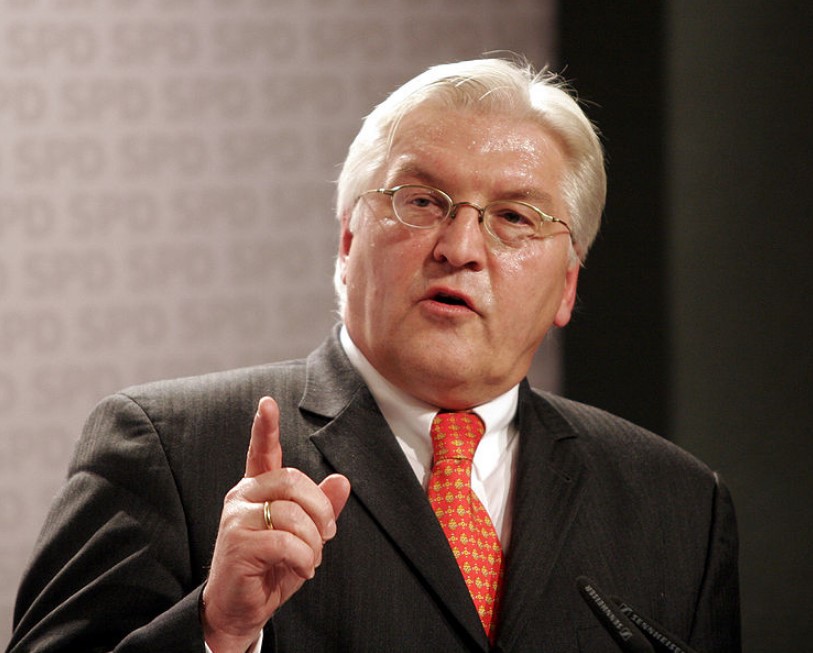 German president Frank-Walter Steinmeier held a 'State of the Nation' address recently, noting that the world was “heading into a period of confrontation” / Image: Armin Kübelbeck
German president Frank-Walter Steinmeier held a 'State of the Nation' address recently, noting that the world was “heading into a period of confrontation” / Image: Armin Kübelbeck
In recent decades, the share of global economic output has changed dramatically. Between the years 2000 and 2019, the volume of global economic output grew significantly, but the USA’s share of this fell from 20.4 percent to 15.1 percent, and the EU’s from 23.5 percent to 16.1 percent, whilst China’s share rose from 7.3 percent to 19.2 percent (measured in terms of purchasing power parity (PPP) according to the Atlas of the World Economy 2020/2021). Together, these imperialist powers dominate the rest of the world, and are jointly responsible for over 50 percent of economic output.
The rise of China as a world power combined with the relative decline of the USA (and, to a much greater extent, the relative decline of the EU), is leading to a change in the balance of power around the globe. Globalisation – the expansion of the international division of labour and the growth of world trade – is turning into its opposite. Alongside the race for dominance on the world market, protectionist processes of decoupling, trade barriers and economic wars are coming to the fore.
Where there were once ‘partners’, there are now ‘competitors’ and ‘systemic rivals’. Although not explicitly stated, this is true of Germany and EU relations with the United States too. The contradictions of global capitalism are forcing the imperialist powers into confrontation. They are driven to pursue their interests at the expense of others.
A network of dependencies
The confrontation between two giants – the USA and China – is wearing down the EU and, above all, German imperialism. The latter had benefited from the long phase of globalisation and relative stability of the world market. German capitalism was able to do business all over the world, growing to become the world’s fourth largest economy, with significant export surpluses. But this position is now in question.
The economic war of the USA and the EU against Russia has cut Germany off from a much-needed source of cheap energy, making the production and export of German goods more expensive and less competitive. Its rivals, the US and China, are the two most important individual trading partners for Germany. In 2021, for example, German companies exported goods worth €104.6 billion to China and imported goods worth €142 billion. In the same year, goods worth €122 billion were exported to the USA, with imports worth over €70 billion.
Furthermore, Germany cannot play a role in world politics independent of the EU. It is also its most important trading partner. In 2020 for example, €546.7 billion worth of goods were imported from the EU to Germany, while €635.7 billion worth of goods were exported to the EU.
Again, China has a central position for EU trade. In 2021, €696 billion worth of goods were traded between China and the EU. This represented 16 percent of total EU trade in goods to the US’ 15 percent. China accounted for 22 percent of goods imported into the EU, while the US accounted for 11 percent. Likewise, 18 percent of exports from the EU went to the US, while 10 percent went to China.
Now the war in Ukraine and the confrontation between the USA and China are forcing the German government and German capital to take sides in order to avoid being completely worn down between these two millstones. Because the economic, political, diplomatic and military relations of the EU member states are historically deeper with the USA than with China, the direction is already set. But this comes at a huge economic and political cost.
Splits at the top
Above all, the military dependence of the EU on NATO, is forcing Germany into a narrow orbit around the USA. This policy of submission to US imperialism is expressed most clearly by the Greens and the Free Democratic Party (FDP). They are loudest of all in insisting on the strengthening of transatlantic relations; greater involvement in the Ukraine war through money and arms deliveries; and sanctions, and a new ‘China strategy’. Central to their China agenda are decoupling and protectionism against Chinese goods and companies in Europe. They want direct involvement in the United States’ containment strategy against China.
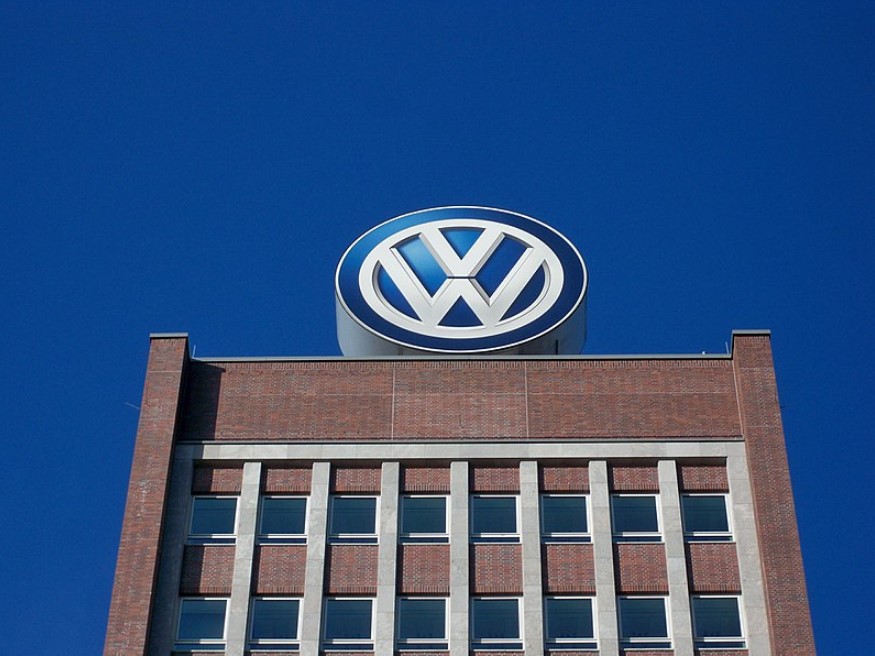 Decoupling from China is unthinkable for companies such as Volkswagen / Image: Vanellus, Wikimedia Commons
Decoupling from China is unthinkable for companies such as Volkswagen / Image: Vanellus, Wikimedia Commons
This approach has not exactly been met with enthusiasm among the companies of the German stock exchange. They maintain important trade relations with China and have made large investments there. Volkswagen sold almost 42 percent of its new cars in China in 2021 and made 40 percent of its profits there. BMW makes almost 23 percent of its sales in China, Siemens 13 percent, Adidas 21 percent, Merck 14.7 percent, Bayer 8.7 percent, Wacker 29 percent, and BASF 15 percent. Decoupling from China is out of the question for these companies.
The German chancellor’s recent trip to China highlighted the lines of division within the German government, and between the corporations and the Greens. In the run-up to the trip, Scholz forced through the partial acquisition of a container terminal at the Port of Hamburg by Chinese state shipping company Cosco, against the will of six government ministries, the foreign intelligence agency, and the Office for the Protection of the Constitution. This manoeuvre, as well as his trip to China, earned the chancellor plenty of criticism, especially from Foreign Minister Annalena Baerbock (of the Greens). Scholz resisted this publicly, even writing a long guest article in the Frankfurter Allgemeine Zeitung on 3 November, in which he defended his trip.
A few days later, in a guest article of their own, the representatives of the business delegation who accompanied the chancellor (heads of the above-mentioned companies of the German stock exchange), rushed to his aid. Whilst they also claimed to be of the opinion that a new strategy was needed that would identify China as a “partner, competitor and strategic rival,” they said that joint business had to be in the foreground.
US ‘America First’ policy humiliates its ‘strategic ally’
At the same time, the US government is looking out for itself alone. The ‘America First’ policy has remained unchanged under the Biden administration. With the multi-billion dollar climate bill, or ‘Inflation Reduction Act’ (IRA), the US government is promising huge subsidies for companies in the energy, transport and hydrogen sectors. The IRA has strict ‘Made in America’ requirements at virtually all stages of production, from the mining and processing of raw materials, to the assembly of preliminary and intermediate products, to recycling. Only those who produce in the USA will be subsidised.
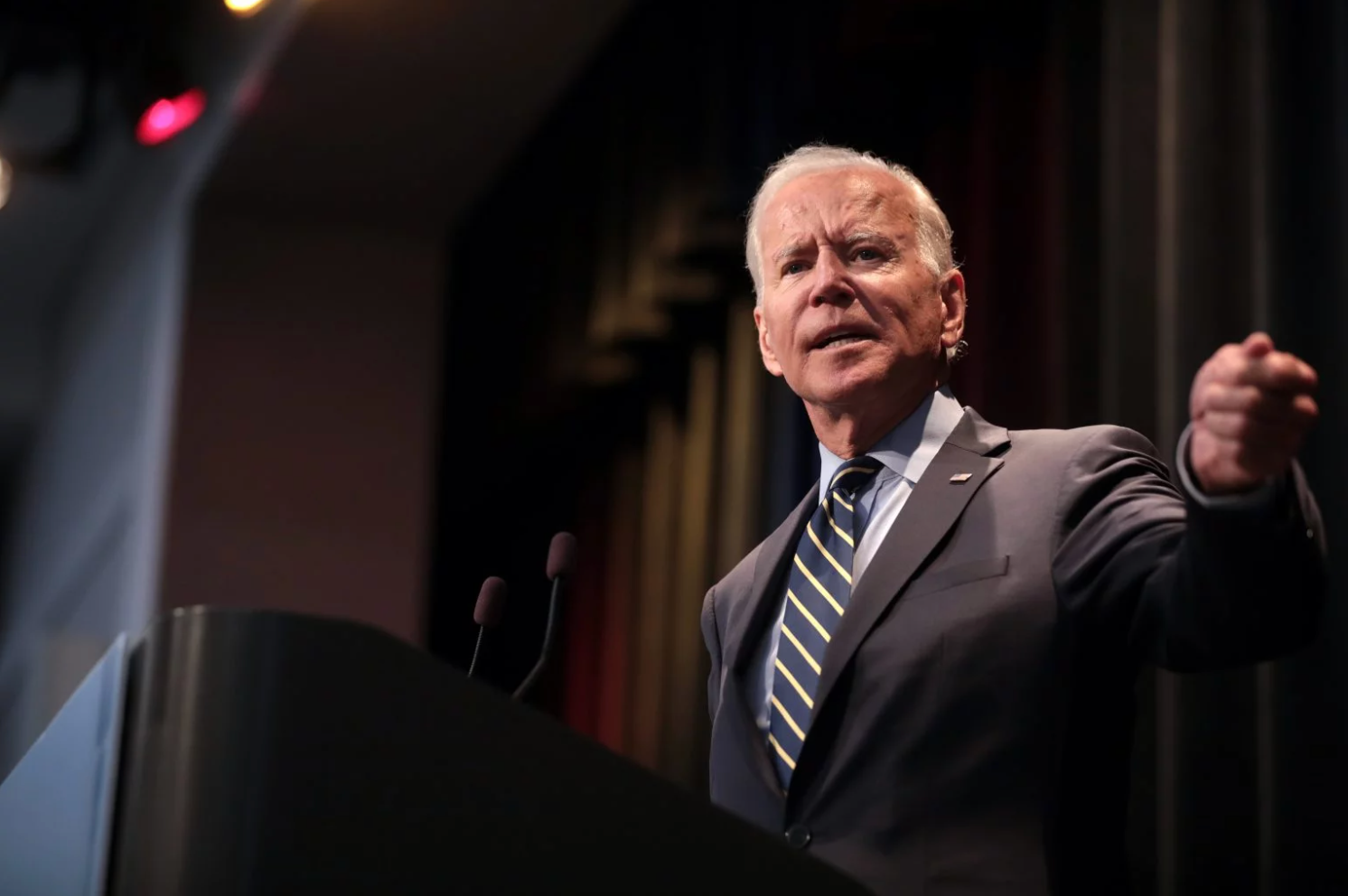 The ‘America First’ policy has remained unchanged under the Biden administration / Image: Gage Skidmore, Wikimedia Commons
The ‘America First’ policy has remained unchanged under the Biden administration / Image: Gage Skidmore, Wikimedia Commons
US capitalism wants to see industrial production from all over the world relocated to the USA. New, more productive plants; control over supply and production chains as well as sources of raw materials; and, above all, profits, are supposed to once again strengthen the dominance of the USA worldwide. Every even vaguely ‘green’ technology is being subsidised to the tune of hundreds of billions of dollars: from batteries and hydrogen, to wind turbines and solar parks. Many German companies, eager to get their hands on some of this cash, have planned to relocate production from Europe to the United States in order to qualify. The list of companies include giants like VW, Audi and Siemens.
Der Spiegel quoted Joe Kaeser (long-time Siemens boss and current chairman of the supervisory board of Siemens Energy and Daimler Truck Holding) as saying that Europe is “no longer in systemic competition with China alone, but to a certain extent also with the USA”. His remark hits the nail on the head. With subsidies and protectionist guidelines, the US is attempting to export its unemployment and to stimulate reindustrialisation. But this can only come at the expense of its ‘strategic ally’ Europe – and the rest of the world, of course.
The EU and the German government can do nothing but stew in their anger. This is a “violation of international trade rules” and the beginning of a “trade war” between the EU and the USA, in the midst of the Ukraine conflict, EU politicians complain. So much for the ‘unbroken unity of the West’: it is a façade. But neither can the EU unite to confront the US. It is also being worn down by a deep internal crisis. All they can do is plead with their ‘ally’. As Der Spiegel put it: “Commission President Ursula von der Leyen implored Biden at the G20 summit in Bali to block the law”. “Showing Washington that we have teeth”, as Green party politician Reinhard Bütikofer announced, plays no part in it.
Walking a tightrope into the unknown
Amidst all this, the governing SPD – whose leaders have reliably pandered to the capitalist class for decades – are trying to balance the contradictory interests of German capitalism. They wish to avoid further disruptions like those in the wake of the pandemic and the Ukraine war. They are driven by a fear of deindustrialisation, “loss of prosperity” and a tsunami of class struggle.
They are working closely with the ruling class to this end. Recently, Rainer Dulger, the president of the BDA (the umbrella organisation of German business associations), demanded that the German government set up a ministry of raw materials to ensure German capital’s access to rare earth minerals, energy sources and other important raw materials. Their particular focus is on Africa, Asia and Latin America – regions in which the USA and China are expanding their spheres of power.
Is this not clear evidence that, as Marx and Engels put it, the state is “but a committee for managing the common affairs of the whole bourgeoisie”? The government, business associations and banks come together to enforce their class interests across the world. This is a central feature of the imperialist epoch, as Lenin explained it back in 1916.
However, the tightrope on which the federal government and German capital are trying to balance is continually fraying, whilst the abyss below them widens. The contradictions enveloping German capitalism on a world scale will not allow a solution in the interests of German imperialism.
Military might
In the imperialist struggle for spheres of influence, resources, markets, technology and labour, the German imperialists wish to hold their own against China, Russia, as well as the USA. In the words of Lars Klingbeil, in a speech given by the SPD leader back in June, said Germany must “lay a claim to being a leading power”. In a world where politicians are throwing up barriers to ‘free trade’, German imperialism can no longer rely on dominating its ‘sphere of influence’ through economic muscle alone. It must also become a military power commensurate with its economic interests.
 With an upgraded, better funded, and more belligerent Bundeswehr, Germany hope to have greater leverage / Image: Bundeswehr
With an upgraded, better funded, and more belligerent Bundeswehr, Germany hope to have greater leverage / Image: Bundeswehr
To underpin their political and economic dominance in the EU, they are setting out to expand their military power in Europe. This is precisely the motivation behind the recent announcement of a €100 billion Special Fund for the armed forces and the increase in annual military spending to at least two percent of GDP. With an upgraded, far better funded, and more belligerent Bundeswehr, they hope to have greater leverage to steer the EU in the interests of German capital.
But the divisions inside the EU set very definite limits on the capacity of German capital to set an independent course. As those divisions deepen, it will only become more difficult to forcefully assert its imperialist interests outside Europe. Sooner or later, they will have to resign themselves to being an unequal ‘ally’ of the USA – a relationship that more closely resembles servitude than friendship.
There will be further and deeper splits in the government and the capitalist class over these strategic issues. This sets the stage for even more political instability, polarisation, and at a certain stage of revolutionary developments in Germany. On this basis, only one thing is certain: the decline of German imperialism will continue, and with it, the decline of the EU.
Class struggle
The desire to stake a claim as a ‘leading power’ ultimately means rearmament. But this kind of unproductive spending will just mean more inflation, and deeper austerity. The class antagonisms in Germany will further intensify. If the defence industry’s share of the state budget grows, then cuts must inevitably be made elsewhere. This will deepen the crisis in infrastructure and healthcare, increase staff shortages in nurseries, schools, clinics and public authorities, and lead to cuts in cultural and other state-funded institutions.
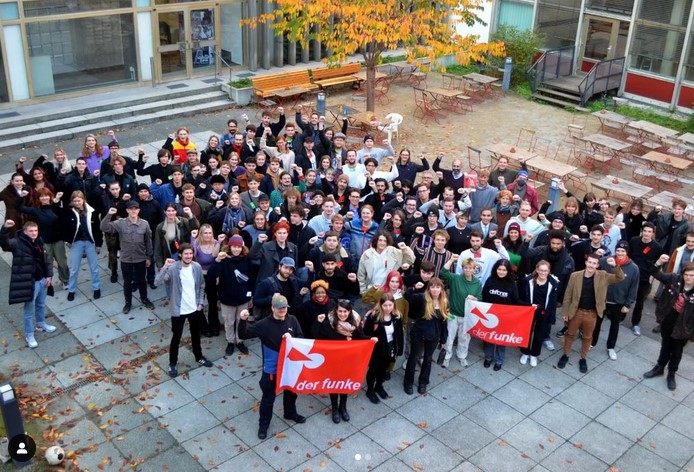 The working class must respond to imperialist policies with class struggle / Image: Der Funke
The working class must respond to imperialist policies with class struggle / Image: Der Funke
It is clear who Steinmeier believes will need the “strength for self-sacrifice” as he put it. The working class must suffer so that the state can upgrade its means of destruction. But this ethic of self-sacrifice is already being put to the test in the collective bargaining struggles being fought by the German Trade Union Confederation. In ‘difficult times’, we are told that the economy should not be burdened with demands for higher wages. But the decline in living standards and the coming slumps and turbulence will provoke a backlash from the working class.
Imperialist conflicts, militarism, the rearmament of the capitalist state, and the strengthening of its means of repression, are always and everywhere at its expense of and directed against the working class. To put an end to this spiral of imperialist conflicts, capitalism must be overthrown in Germany and worldwide. The working class must respond to imperialist policies with class struggle.

